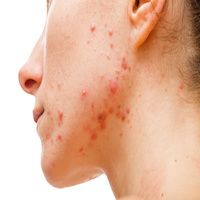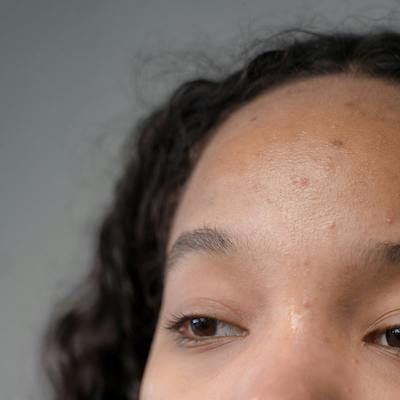Article
TNFis Shown to Be Effective for Refractory Acne Treatment, May Also Induce Acne
Author(s):
New data from a systematic literature review highlighted the connection with tumor necrosis factor-α inhibitors and acne, indicating the need for further study.

Tumor necrosis factor–α inhibitors (TNFis) were found to be effective in refractory acne treatment, although they can be associated with acne occurrence in some instances, a recent systematic review suggests.1
TNF-α inhibitors—medications approved for treating inflammatory diseases—are occasionally used off-label for severe acne that doesn't respond to traditional treatments. However, their use can promote the development of acne, indicating a possible link between TNFis and acne.
The investigators chose to examine this connection further, as much of the available literature on this subject consists of unreviewed case reports. The review was authored by Aaron Gabriel W. Sandoval, MPhil, MSc, from Harvard Medical School.
“Given the elevation of cytokines, such as tumor necrosis factor–α (TNF), interleukin-17, and interleukin-1β in acne, TNF inhibitors (TNFis) have been considered as a potential treatment option for severe, recalcitrant acne or in the setting of inflammatory syndromes,” Sandoval and colleagues wrote. “However, acne occurrence following TNFi use for other conditions has also been reported.”
The investigators’ literature review describes the research available relating to TNFi use both in the treatment and the occurrence of acne.2
Background and Findings
The investigators conducted a methodical review of the available literature, using PubMed and Web of Science searches for articles that had been published from the beginning of these databases through to October of 2022.
They included studies in their review that had reported on patients of any age or gender who had been given TNFis and developed or resolved their acne. The team also used 2 reviewers to independently assess the studies, extract data from each, and analyze them quantitatively.
Overall, the investigators found that of the 53 studies included, there were a total of 64 patients who had been given TNFis for acne treatment or who had gotten acne following TNFi treatment for a separate issue. The patients had a mean age of 28.7 years and 8.8% were female.
The researchers concluded that about 93.6% of patients given the TNFis etanercept, adalimumab, or infliximab, had ended up experiencing either partial improvement or clearance of their acne (53.2% and 40.4%, respectively).
They found that only around 6.4% of these patients reported any adverse effects. Furthermore, the investigators noted that 63.8% of the patients assessed had experienced acne as a component of an inflammatory syndrome.
The team noted that of the 17 patients who had developed acne following TNFi treatment for a different condition, only a single patient had a prior history of acne. In the majority of cases, TNFis were stopped or adjusted after the onset of acne, leading to symptom improvement.
“Further studies elucidating the role that TNF plays in treating and inducing acne could yield insight into off-label TNFi use and acne pathogenesis, potentially guiding clinical care of patients with acne treated or induced by TNFis,” they wrote.
References
- Sandoval AGW, Vaughn LT, Huang JT, Barbieri JS. Role of Tumor Necrosis Factor–α Inhibitors in the Treatment and Occurrence of Acne: A Systematic Review. JAMA Dermatol. Published online March 17, 2023. doi:10.1001/jamadermatol.2023.0269.
- Kurokawa I, Layton AM, Ogawa R. Updated treatment for acne: targeted therapy based on pathogenesis. Dermatol Ther (Heidelb). 2021;11(4):1129-1139. doi:10.1007/s13555-021-00552-6.


